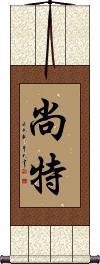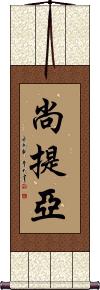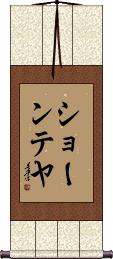Many custom options...
And formats...

Aunt in Chinese / Japanese...
Buy an Aunt calligraphy wall scroll here!
Personalize your custom “Aunt” project by clicking the button next to your favorite “Aunt” title below...
Switched to secondary search mode due to lack of results using primary.
These secondary results may not be very accurate. Try a different but similar meaning word or phrase for better results. Or...
Look up Aunt in my Japanese Kanji & Chinese Character Dictionary(My dictionary is a different system then the calligraphy search you just tried)
If you want a special phrase, word, title, name, or proverb, feel free to contact me, and I will translate your custom calligraphy idea for you.
Chaunte
Chaunte
Undaunted After Repeated Setbacks
Persistence to overcome all challenges
百折不撓 is a Chinese proverb that means “Be undaunted in the face of repeated setbacks.”
More directly translated, it reads, “[Overcome] a hundred setbacks, without flinching.” 百折不撓 is of Chinese origin but is commonly used in Japanese and somewhat in Korean (same characters, different pronunciation).
This proverb comes from a long, and occasionally tragic story of a man that lived sometime around 25-220 AD. His name was Qiao Xuan, and he never stooped to flattery but remained an upright person at all times. He fought to expose the corruption of higher-level government officials at great risk to himself.
Then when he was at a higher level in the Imperial Court, bandits were regularly capturing hostages and demanding ransoms. But when his own son was captured, he was so focused on his duty to the Emperor and the common good that he sent a platoon of soldiers to raid the bandits' hideout, and stop them once and for all even at the risk of his own son's life. While all of the bandits were arrested in the raid, they killed Qiao Xuan's son at first sight of the raiding soldiers.
Near the end of his career, a new Emperor came to power, and Qiao Xuan reported to him that one of his ministers was bullying the people and extorting money from them. The new Emperor refused to listen to Qiao Xuan and even promoted the corrupt Minister. Qiao Xuan was so disgusted that in protest, he resigned from his post as minister (something almost never done) and left for his home village.
His tombstone reads “Bai Zhe Bu Nao” which is now a proverb used in Chinese culture to describe a person of strong will who puts up stubborn resistance against great odds.
My Chinese-English dictionary defines these 4 characters as “keep on fighting despite all setbacks,” “be undaunted by repeated setbacks,” and “be indomitable.”
Our translator says it can mean “never give up” in modern Chinese.
Although the first two characters are translated correctly as “repeated setbacks,” the literal meaning is “100 setbacks” or “a rope that breaks 100 times.” The last two characters can mean “do not yield” or “do not give up.”
Most Chinese, Japanese, and Korean people will not take this absolutely literal meaning but will instead understand it as the title suggests above. If you want a single big word definition, it would be indefatigability, indomitableness, persistence, or unyielding.
See Also: Tenacity | Fortitude | Strength | Perseverance | Persistence
Shaunteya
Shaunteya
Carry On, Undaunted
前赴後繼 is a Chinese proverb that figuratively means “to advance dauntlessly in wave upon wave.”
It suggests that you should or can carry on and have the strength to keep going.
While this proverb is a little bit militaristic, it suggests that despite a fallen comrade (or perhaps a loved one), you should keep going and work towards the goal they intended.
Not the results for Aunt that you were looking for?
Below are some entries from our dictionary that may match your Aunt search...
| Characters If shown, 2nd row is Simp. Chinese |
Pronunciation Romanization |
Simple Dictionary Definition |
姑 see styles |
gū gu1 ku sachimi さちみ |
paternal aunt; husband's sister; husband's mother (old); nun; for the time being (literary) (See 舅) mother-in-law; (personal name) Sachimi Paternal aunt, husband's sister, a nun; to tolerate; however; leave. |
姨 see styles |
yí yi2 i |
mother's sister; aunt |
娘 see styles |
niáng niang2 niang musume(p); ko むすめ(P); こ |
mother; young lady; (coll.) effeminate (1) daughter; (2) girl (i.e. a young, unmarried woman) Lady, wife, mother, aunt. |
伯母 see styles |
bó mǔ bo2 mu3 po mu uba うば |
wife of father's elder brother; aunt; (polite form of address for a woman who is about the age of one's mother); CL:個|个[ge4] aunt; (surname) Uba |
佛母 see styles |
fó mǔ fo2 mu3 fo mu butsubo |
(1) The mother of the Buddha, Mahāmāyā, 摩耶 Māyā, or Mātṛkā. (2) His aunt who was his foster-mother. (3) The Dharma or Law which produced him. (4) The prajñā-pāramitā, mother or begetter of all Buddhas. (5) Other "Buddha-mothers", e.g. 准提佛母; 孔雀佛母, etc. Cf. 佛眼. |
叔婆 see styles |
shū pó shu1 po2 shu p`o shu po |
aunt by marriage; husband's aunt; husband's father's younger brother's wife |
叔母 see styles |
shū mǔ shu1 mu3 shu mu shukubo しゅくぼ oba おば |
aunt; wife of father's younger brother aunt |
大姨 see styles |
dà yí da4 yi2 ta i |
aunt (mother's eldest sister); (respectful term of address for a woman who is about the age of one's mother) |
大娘 see styles |
dà niáng da4 niang2 ta niang |
(coll.) father's older brother's wife; aunt (polite address) |
大媽 大妈 see styles |
dà mā da4 ma1 ta ma |
father's elder brother's wife; aunt (affectionate term for an elderly woman) |
姑丈 see styles |
gū zhàng gu1 zhang4 ku chang |
husband of paternal aunt |
姑夫 see styles |
gū fu gu1 fu5 ku fu |
father's sister's husband; husband of paternal aunt; uncle |
姑姑 see styles |
gū gu gu1 gu5 ku ku |
paternal aunt; CL:個|个[ge4] |
姑娘 see styles |
gū niang gu1 niang5 ku niang kuunyan; kuunyan / kunyan; kunyan クーニャン; クウニャン |
girl; young woman; young lady; daughter; paternal aunt (old); CL:個|个[ge4] girl (esp. Chinese) (chi: gūniang); young unmarried woman |
姑媽 姑妈 see styles |
gū mā gu1 ma1 ku ma |
(coll.) father's married sister; paternal aunt |
姑母 see styles |
gū mǔ gu1 mu3 ku mu |
father's sister; paternal aunt |
姑父 see styles |
gū fu gu1 fu5 ku fu |
father's sister's husband; husband of paternal aunt; uncle |
姨娘 see styles |
yí niáng yi2 niang2 i niang |
maternal aunt; father's concubine (old) |
姨媽 姨妈 see styles |
yí mā yi2 ma1 i ma |
(coll.) mother's sister; maternal aunt |
姨母 see styles |
yí mǔ yi2 mu3 i mu |
mother's sister; maternal aunt |
娘娘 see styles |
niáng niang niang2 niang5 niang niang nyannyan ニャンニャン |
queen; empress; imperial concubine; Goddess, esp. Xi Wangmu 王母娘娘 or 西王母, Queen Mother of the West; mother; aunt Niangniang (chi:); Chinese goddess |
嬸嬸 婶婶 see styles |
shěn shen shen3 shen5 shen shen |
wife of father's younger brother; aunt |
嬸子 婶子 see styles |
shěn zi shen3 zi5 shen tzu |
(coll.) father's younger brother's wife; aunt |
嬸母 婶母 see styles |
shěn mǔ shen3 mu3 shen mu |
wife of father's younger brother; aunt |
從母 从母 see styles |
cóng mǔ cong2 mu3 ts`ung mu tsung mu |
maternal aunt |
舅媽 舅妈 see styles |
jiù mā jiu4 ma1 chiu ma |
(coll.) aunt; maternal uncle's wife |
舅母 see styles |
jiù mǔ jiu4 mu3 chiu mu |
wife of mother's brother; aunt; maternal uncle's wife |
阿姨 see styles |
ā yí a1 yi2 a i |
maternal aunt; step-mother; childcare worker; nursemaid; woman of similar age to one's parents (term of address used by child); CL:個|个[ge4] |
八敬戒 see styles |
bā jìng jiè ba1 jing4 jie4 pa ching chieh hakkyōkai |
The eight commands given by the Buddha to his foster-mother, i.e. aunt, when she was admitted to the order, and which remain as commands to nuns: (1) even though a hundred years old a nun must pay respect to a monk, however young, and offer her seat to him; (2) must never scold a monk; (3) never accuse, or speak of his misdeeds; but a monk may speak of hers; (4) at his hands obtain reception into the order; (5) confess sin (sexual or other) before the assembly of monks and nuns; (6) ask the fraternity for a monk as preceptor; (7) never share the same summer resort with monks; (8) after the summer retreat she must report and ask for a responsible confessor. Also 八敬法; 八不可越法 (or 八不可過法) ; 八尊重法; v. 四分律 48. |
叔丈母 see styles |
shū zhàng mǔ shu1 zhang4 mu3 shu chang mu |
wife's aunt |
Click here for more Aunt results from our dictionary
The following table may be helpful for those studying Chinese or Japanese...
| Title | Characters | Romaji (Romanized Japanese) | Various forms of Romanized Chinese | |
| Chaunte | 尚特 | shàng tè / shang4 te4 / shang te / shangte | shang t`e / shangte / shang te | |
| Chaunte | シャンテー | shantei | ||
| Undaunted After Repeated Setbacks | 百折不撓 百折不挠 | hyaku setsu su tou hyakusetsusutou hyaku setsu su to | bǎi zhé bù náo bai3 zhe2 bu4 nao2 bai zhe bu nao baizhebunao | pai che pu nao paichepunao |
| Shaunteya | 尚提亞 尚提亚 | shàng tí yà shang4 ti2 ya4 shang ti ya shangtiya | shang t`i ya shangtiya shang ti ya |
|
| Shaunteya | ショーンテヤ | shoonteya / shonteya | ||
| Carry On, Undaunted | 前赴後繼 前赴后继 | qián fù hòu jì qian2 fu4 hou4 ji4 qian fu hou ji qianfuhouji | ch`ien fu hou chi chienfuhouchi chien fu hou chi |
|
| In some entries above you will see that characters have different versions above and below a line. In these cases, the characters above the line are Traditional Chinese, while the ones below are Simplified Chinese. | ||||
Successful Chinese Character and Japanese Kanji calligraphy searches within the last few hours...









